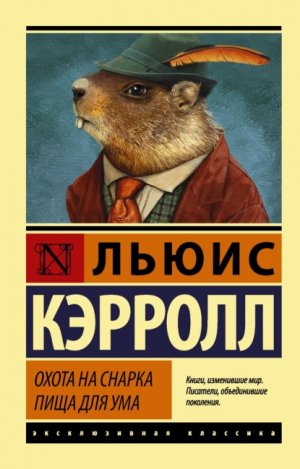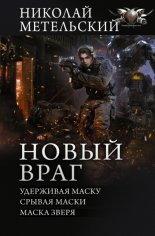Охота на Снарка. Пища для ума Кэрролл Льюис

© ООО «Издательство АСТ», 2020
The Hunting of the Snark
An Agony in Eight Fits
Fit the First
The Landing
- “Just the place for a Snark!” the Bellman cried,
- As he landed his crew with care;
- Supporting each man on the top of the tide
- By a finger entwined in his hair.
- “Just the place for a Snark! I have said it twice:
- That alone should encourage the crew.
- Just the place for a Snark! I have said it thrice:
- What I tell you three times is true.”
- The crew was complete: it included a Boots —
- A maker of Bonnets and Hoods —
- A Barrister, brought to arrange their disputes —
- And a Broker, to value their goods.
- A Billiard-marker, whose skill was immense,
- Might perhaps have won more than his share —
- But a Banker, engaged at enormous expense,
- Had the whole of their cash in his care.
- There was also a Beaver, that paced on the deck,
- Or would sit making lace in the bow:
- And had often (the Bellman said) saved them from wreck,
- Though none of the sailors knew how.
- There was one who was famed for the number of things
- He forgot when he entered the ship:
- His umbrella, his watch, all his jewels and rings,
- And the clothes he had bought for the trip.
- He had forty-two boxes, all carefully packed,
- With his name painted clearly on each:
- But, since he omitted to mention the fact,
- They were all left behind on the beach.
- The loss of his clothes hardly mattered, because
- He had seven coats on when he came,
- With three pair of boots – but the worst of it was,
- He had wholly forgotten his name.
- He would answer to “Hi!” or to any loud cry,
- Such as “Fry me!” or “Fritter my wig!”
- To “What-you-may-call-um!” or “What-was-his-name!”
- But especially “Thing-um-a-jig!”
- While, for those who preferred a more forcible word,
- He had different names from these:
- His intimate friends called him “Candle-ends,”
- And his enemies “Toasted-cheese.”
- “His form is ungainly – his intellect small —”
- (So the Bellman would often remark)
- “But his courage is perfect! And that, after all,
- Is the thing that one needs with a Snark.”
- He would joke with hynas, returning their stare
- With an impudent wag of the head:
- And he once went a walk, paw-in-paw, with a bear,
- “Just to keep up its spirits,” he said.
- He came as a Baker: but owned, when too late —
- And it drove the poor Bellman half-mad —
- He could only bake Bridecake – for which, I may state,
- No materials were to be had.
- The last of the crew needs especial remark,
- Though he looked an incredible dunce:
- He had just one idea – but, that one being “Snark,”
- The good Bellman engaged him at once.
- He came as a Butcher: but gravely declared,
- When the ship had been sailing a week,
- He could only kill Beavers. The Bellman looked scared,
- And was almost too frightened to speak:
- But at length he explained, in a tremulous tone,
- There was only one Beaver on board;
- And that was a tame one he had of his own,
- Whose death would be deeply deplored.
- The Beaver, who happened to hear the remark,
- Protested, with tears in its eyes,
- That not even the rapture of hunting the Snark
- Could atone for that dismal surprise!
- It strongly advised that the Butcher should be
- Conveyed in a separate ship:
- But the Bellman declared that would never agree
- With the plans he had made for the trip:
- Navigation was always a difficult art,
- Though with only one ship and one bell:
- And he feared he must really decline, for his part,
- Undertaking another as well.
- The Beaver’s best course was, no doubt, to procure
- A second-hand dagger-proof coat —
- So the Baker advised it – and next, to insure
- Its life in some Office of note:
- This the Banker suggested, and offered for hire
- (On moderate terms), or for sale,
- Two excellent Policies, one Against Fire,
- And one Against Damage From Hail.
- Yet still, ever after that sorrowful day,
- Whenever the Butcher was by,
- The Beaver kept looking the opposite way,
- And appeared unaccountably shy.
Fit the Second
The Bellman’s Speech
- The Bellman himself they all praised to the skies —
- Such a carriage, such ease and such grace!
- Such solemnity, too! One could see he was wise,
- The moment one looked in his face!
- He had bought a large map representing the sea,
- Without the least vestige of land:
- And the crew were much pleased when they found it to be
- A map they could all understand.
- “What’s the good of Mercator’s North Poles
- and Equators,
- Tropics, Zones, and Meridian Lines?”
- So the Bellman would cry: and the crew would reply
- “They are merely conventional signs!
- “Other maps are such shapes, with their islands
- and capes!
- But we’ve got our brave Captain to thank”
- (So the crew would protest) “that he’s bought us
- the best —
- A perfect and absolute blank!”
- This was charming, no doubt: but they shortly found out
- That the Captain they trusted so well
- Had only one notion for crossing the ocean,
- And that was to tingle his bell.
- He was thoughtful and grave – but the orders he gave
- Were enough to bewilder a crew.
- When he cried “Steer to starboard, but keep her head
- larboard!”
- What on earth was the helmsman to do?
- Then the bowsprit got mixed with the rudder sometimes:
- A thing, as the Bellman remarked,
- That frequently happens in tropical climes,
- When a vessel is, so to speak, “snarked.”
- But the principal failing occurred in the sailing,
- And the Bellman, perplexed and distressed,
- Said he had hoped, at least, when the wind blew
- due East,
- That the ship would not travel due West!
- But the danger was past – they had landed at last,
- With their boxes, portmanteaus, and bags:
- Yet at first sight the crew were not pleased with the view,
- Which consisted of chasms and crags.
- The Bellman perceived that their spirits were low,
- And repeated in musical tone
- Some jokes he had kept for a season of woe —
- But the crew would do nothing but groan.
- He served out some grog with a liberal hand, And bade them sit down on the beach:
- And they could not but own that their Captain
- looked grand,
- As he stood and delivered his speech.
- “Friends, Romans, and countrymen, lend me your ears!”
- (They were all of them fond of quotations:
- So they drank to his health, and they gave him
- three cheers,
- While he served out additional rations).
- “We have sailed many months, we have sailed
- many weeks,
- (Four weeks to the month you may mark),
- But never as yet (’tis your Captain who speaks)
- Have we caught the least glimpse of a Snark!
- “We have sailed many weeks, we have sailed many days,
- (Seven days to the week I allow),
- But a Snark, on the which we might lovingly gaze,
- We have never beheld till now!
- “Come, listen, my men, while I tell you again
- The five unmistakable marks
- By which you may know, wheresoever you go,
- The warranted genuine Snarks.
- “Let us take them in order. The first is the taste,
- Which is meagre and hollow, but crisp:
- Like a coat that is rather too tight in the waist,
- With a flavour of Will-o’-the-wisp.
- “Its habit of getting up late you’ll agree
- That it carries too far, when I say
- That it frequently breakfasts at five-o’clock tea,
- And dines on the following day.
- “The third is its slowness in taking a jest.
- Should you happen to venture on one,
- It will sigh like a thing that is deeply distressed:
- And it always looks grave at a pun.
- “The fourth is its fondness for bathing-machines,
- Which it constantly carries about,
- And believes that they add to the beauty of scenes —
- A sentiment open to doubt.
- “The fifth is ambition. It next will be right
- To describe each particular batch:
- Distinguishing those that have feathers, and bite,
- From those that have whiskers, and scratch.
- “For, although common Snarks do no manner of harm,
- Yet, I feel it my duty to say,
- Some are Boojums —” The Bellman broke off in alarm,
- For the Baker had fainted away.
Fit the Third
The Baker’s Tale
- They roused him with muffins – they roused him
- with ice —
- They roused him with mustard and cress —
- They roused him with jam and judicious advice —
- They set him conundrums to guess.
- When at length he sat up and was able to speak,
- His sad story he offered to tell;
- And the Bellman cried “Silence! Not even a shriek!”
- And excitedly tingled his bell.
- There was silence supreme! Not a shriek, not a scream,
- Scarcely even a howl or a groan,
- As the man they called “Ho!” told his story of woe
- In an antediluvian tone.
- “My father and mother were honest, though poor —”
- “Skip all that!” cried the Bellman in haste.
- “If it once becomes dark, there’s no chance of a Snark —
- We have hardly a minute to waste!”
- “I skip forty years,” said the Baker, in tears,
- “And proceed without further remark
- To the day when you took me aboard of your ship
- To help you in hunting the Snark.
- “A dear uncle of mine (after whom I was named)
- Remarked, when I bade him farewell —”
- “Oh, skip your dear uncle!” the Bellman exclaimed,
- As he angrily tingled his bell.
- “He remarked to me then,” said that mildest of men,
- “ ‘If your Snark be a Snark, that is right:
- Fetch it home by all means – you may serve it with greens,
- And it’s handy for striking a light.
- “ ‘You may seek it with thimbles – and seek it with care;
- You may hunt it with forks and hope;
- You may threaten its life with a railway-share;
- You may charm it with smiles and soap —’ ”
- (“That’s exactly the method,” the Bellman bold
- In a hasty parenthesis cried,
- “That’s exactly the way I have always been told
- That the capture of Snarks should be tried!”)
- “ ‘But oh, beamish nephew, beware of the day,
- If your Snark be a Boojum! For then
- You will softly and suddenly vanish away,
- And never be met with again!’
- “It is this, it is this that oppresses my soul,
- When I think of my uncle’s last words:
- And my heart is like nothing so much as a bowl
- Brimming over with quivering curds!
- “It is this, it is this —” “We have had that before!”
- The Bellman indignantly said.
- And the Baker replied “Let me say it once more.
- It is this, it is this that I dread!
- “I engage with the Snark – every night after dark —
- In a dreamy delirious fight:
- I serve it with greens in those shadowy scenes,
- And I use it for striking a light:
- “But if ever I meet with a Boojum, that day,
- In a moment (of this I am sure),
- I shall softly and suddenly vanish away —
- And the notion I cannot endure!”
Fit the Fourth
The Hunting
- The Bellman looked uffish, and wrinkled his brow.
- “If only you’d spoken before!
- It’s excessively awkward to mention it now,
- With the Snark, so to speak, at the door!
- “We should all of us grieve, as you well may believe,
- If you never were met with again —
- But surely, my man, when the voyage began,
- You might have suggested it then?
- “It’s excessively awkward to mention it now —
- As I think I’ve already remarked.”
- And the man they called “Hi!” replied, with a sigh,
- “I informed you the day we embarked.
- “You may charge me with murder – or want of sense —
- (We are all of us weak at times):
- But the slightest approach to a false pretence
- Was never among my crimes!
- “I said it in Hebrew – I said it in Dutch —
- I said it in German and Greek:
- But I wholly forgot (and it vexes me much)
- That English is what you speak!”
- “ ’Tis a pitiful tale,” said the Bellman, whose face
- Had grown longer at every word:
- “But, now that you’ve stated the whole of your case,
- More debate would be simply absurd.
- “The rest of my speech” (he explained to his men)
- “You shall hear when I’ve leisure to speak it.
- But the Snark is at hand, let me tell you again!
- ’Tis your glorious duty to seek it!
- “To seek it with thimbles, to seek it with care;
- To pursue it with forks and hope;
- To threaten its life with a railway-share;
- To charm it with smiles and soap!
- “For the Snark’s a peculiar creature, that won’t
- Be caught in a commonplace way.
- Do all that you know, and try all that you don’t:
- Not a chance must be wasted to-day!
- “For England expects – I forbear to proceed:
- ’Tis a maxim tremendous, but trite:
- And you’d best be unpacking the things that you need
- To rig yourselves out for the fight.”
- Then the Banker endorsed a blank cheque
- (which he crossed),
- And changed his loose silver for notes.
- The Baker with care combed his whiskers and hair,
- And shook the dust out of his coats.
- The Boots and the Broker were sharpening a spade —
- Each working the grindstone in turn:
- But the Beaver went on making lace, and displayed
- No interest in the concern:
- Though the Barrister tried to appeal to its pride,
- And vainly proceeded to cite
- A number of cases, in which making laces
- Had been proved an infringement of right.
- The maker of Bonnets ferociously planned
- A novel arrangement of bows:
- While the Billiard-marker with quivering hand
- Was chalking the tip of his nose.
- But the Butcher turned nervous, and dressed himself
- fine,
- With yellow kid gloves and a ruff —
- Said he felt it exactly like going to dine,
- Which the Bellman declared was all “stuff.”
- “Introduce me, now there’s a good fellow,” he said,
- “If we happen to meet it together!”
- And the Bellman, sagaciously nodding his head,
- Said “That must depend on the weather.”
- The Beaver went simply galumphing about,
- At seeing the Butcher so shy:
- And even the Baker, though stupid and stout,
- Made an effort to wink with one eye.
- “Be a man!” said the Bellman in wrath, as he heard
- The Butcher beginning to sob.
- “Should we meet with a Jubjub, that desperate bird,
- We shall need all our strength for the job!”
Fit the Fifth
The Beaver’s Lesson
- They sought it with thimbles, they sought it with care;
- They pursued it with forks and hope;
- They threatened its life with a railway-share;
- They charmed it with smiles and soap.
- Then the Butcher contrived an ingenious plan
- For making a separate sally;
- And had fixed on a spot unfrequented by man,
- A dismal and desolate valley.
- But the very same plan to the Beaver occurred:
- It had chosen the very same place:
- Yet neither betrayed, by a sign or a word,
- The disgust that appeared in his face.
- Each thought he was thinking of nothing but “Snark”
- And the glorious work of the day;
- And each tried to pretend that he did not remark
- That the other was going that way.
- But the valley grew narrow and narrower still,
- And the evening got darker and colder,
- Till (merely from nervousness, not from goodwill)
- They marched along shoulder to shoulder.
- Then a scream, shrill and high, rent the shuddering sky,
- And they knew that some danger was near:
- The Beaver turned pale to the tip of its tail,
- And even the Butcher felt queer.
- He thought of his childhood, left far far behind —
- That blissful and innocent state —
- The sound so exactly recalled to his mind
- A pencil that squeaks on a slate!
- “ ’Tis the voice of the Jubjub!” he suddenly cried.
- (This man, that they used to call “Dunce.”)
- “As the Bellman would tell you,” he added with pride,
- “I have uttered that sentiment once.
- “ ’Tis the note of the Jubjub! Keep count, I entreat;
- You will find I have told it you twice.
- ’Tis the song of the Jubjub! The proof is complete,
- If only I’ve stated it thrice.”
- The Beaver had counted with scrupulous care,
- Attending to every word:
- But it fairly lost heart, and outgrabe in despair,
- When the third repetition occurred.
- It felt that, in spite of all possible pains,
- It had somehow contrived to lose count,
- And the only thing now was to rack its poor brains
- By reckoning up the amount.
- “Two added to one – if that could but be done,”
- It said, “with one’s fingers and thumbs!”
- Recollecting with tears how, in earlier years,
- It had taken no pains with its sums.
- “The thing can be done,” said the Butcher, “I think.
- The thing must be done, I am sure.
- The thing shall be done! Bring me paper and ink,
- The best there is time to procure.”
- The Beaver brought paper, portfolio, pens,
- And ink in unfailing supplies:
- While strange creepy creatures came out of their dens,
- And watched them with wondering eyes.
- So engrossed was the Butcher, he heeded them not,
- As he wrote with a pen in each hand,
- And explained all the while in a popular style
- Which the Beaver could well understand.
- “Taking Three as the subject to reason about —
- A convenient number to state —
- We add Seven, and Ten, and then multiply out
- By One Thousand diminished by Eight.
- “The result we proceed to divide, as you see,
- By Nine Hundred and Ninety and Two:
- Then subtract Seventeen, and the answer must be
- Exactly and perfectly true.
- “The method employed I would gladly explain,
- While I have it so clear in my head,
- If I had but the time and you had but the brain —
- But much yet remains to be said.
- “In one moment I’ve seen what has hitherto been
- Enveloped in absolute mystery,
- And without extra charge I will give you at large
- A Lesson in Natural History.”
- In his genial way he proceeded to say
- (Forgetting all laws of propriety,
- And that giving instruction, without introduction,
- Would have caused quite a thrill in Society),
- “As to temper the Jubjub’s a desperate bird,
- Since it lives in perpetual passion:
- Its taste in costume is entirely absurd —
- It is ages ahead of the fashion:
- “But it knows any friend it has met once before:
- It never will look at a bribe:
- And in charity-meetings it stands at the door,
- And collects – though it does not subscribe.
- “Its flavour when cooked is more exquisite far
- Than mutton, or oysters, or eggs:
- (Some think it keeps best in an ivory jar,
- And some, in mahogany kegs:)
- “You boil it in sawdust: you salt it in glue:
- You condense it with locusts and tape:
- Still keeping one principal object in view —
- To preserve its symmetrical shape.”
- The Butcher would gladly have talked till next day,
- But he felt that the Lesson must end,
- And he wept with delight in attempting to say
- He considered the Beaver his friend.
- While the Beaver confessed, with affectionate looks
- More eloquent even than tears,
- It had learned in ten minutes far more than all books
- Would have taught it in seventy years.
- They returned hand-in-hand, and the Bellman, unmanned
- (For a moment) with noble emotion,
- Said “This amply repays all the wearisome days
- We have spent on the billowy ocean!”
- Such friends, as the Beaver and Butcher became,
- Have seldom if ever been known;
- In winter or summer, ’twas always the same —
- You could never meet either alone.
- And when quarrels arose – as one frequently finds
- Quarrels will, spite of every endeavour —
- The song of the Jubjub recurred to their minds,
- And cemented their friendship for ever!
Fit the Sixth
The Barrister’s Dream
- They sought it with thimbles, they sought it with care;
- They pursued it with forks and hope;
- They threatened its life with a railway-share;
- They charmed it with smiles and soap.
- But the Barrister, weary of proving in vain
- That the Beaver’s lace-making was wrong,
- Fell asleep, and in dreams saw the creature quite plain
- That his fancy had dwelt on so long.
- He dreamed that he stood in a shadowy Court,
- Where the Snark, with a glass in its eye,
- Dressed in gown, bands, and wig, was defending a pig
- On the charge of deserting its sty.
- The Witnesses proved, without error or flaw,
- That the sty was deserted when found:
- And the Judge kept explaining the state of the law
- In a soft under-current of sound.
- The indictment had never been clearly expressed,
- And it seemed that the Snark had begun,
- And had spoken three hours, before any one guessed
- What the pig was supposed to have done.
- The Jury had each formed a different view
- (Long before the indictment was read),
- And they all spoke at once, so that none of them knew
- One word that the others had said.
- “You must know —” said the Judge: but the Snark
- exclaimed “Fudge!
- That statute is obsolete quite!
- Let me tell you, my friends, the whole question depends
- On an ancient manorial right.
- “In the matter of Treason the pig would appear
- To have aided, but scarcely abetted:
- While the charge of Insolvency fails, it is clear,
- If you grant the plea ‘never indebted.’
- “The fact of Desertion I will not dispute;
- But its guilt, as I trust, is removed
- (So far as relates to the costs of this suit)
- By the Alibi which has been proved.
- “My poor client’s fate now depends on your votes.”
- Here the speaker sat down in his place,
- And directed the Judge to refer to his notes
- And briefly to sum up the case.
- But the Judge said he never had summed up before;
- So the Snark undertook it instead,
- And summed it so well that it came to far more
- Than the Witnesses ever had said!
- When the verdict was called for, the Jury declined,
- As the word was so puzzling to spell;
- But they ventured to hope that the Snark wouldn’t mind
- Undertaking that duty as well.
- So the Snark found the verdict, although, as it owned,
- It was spent with the toils of the day:
- When it said the word “GUILTY!” the Jury all groaned,
- And some of them fainted away.
- Then the Snark pronounced sentence, the Judge being
- quite
- Too nervous to utter a word:
- When it rose to its feet, there was silence like night,
- And the fall of a pin might be heard.
- “Transportation for life” was the sentence it gave,
- “And then to be fined forty pound.”
- The Jury all cheered, though the Judge said he feared
- That the phrase was not legally sound.
- But their wild exultation was suddenly checked
- When the jailer informed them, with tears,
- Such a sentence would have not the slightest effect,
- As the pig had been dead for some years.
- The Judge left the Court, looking deeply disgusted:
- But the Snark, though a little aghast,
- As the lawyer to whom the defence was intrusted,
- Went bellowing on to the last.
- Thus the Barrister dreamed, while the bellowing seemed
- To grow every moment more clear:
- Till he woke to the knell of a furious bell,
- Which the Bellman rang close at his ear.
Fit the Seventh
The Banker’s Fate
- They sought it with thimbles, they sought it with care;
- They pursued it with forks and hope;
- They threatened its life with a railway-share;
- They charmed it with smiles and soap.
- And the Banker, inspired with a courage so new
- It was matter for general remark,
- Rushed madly ahead and was lost to their view
- In his zeal to discover the Snark
- But while he was seeking with thimbles and care,
- A Bandersnatch swiftly drew nigh
- And grabbed at the Banker, who shrieked in despair,
- For he knew it was useless to fly.
- He offered large discount – he offered a cheque
- (Drawn “to bearer”) for seven-pounds-ten:
- But the Bandersnatch merely extended its neck
- And grabbed at the Banker again.
- Without rest or pause – while those frumious jaws
- Went savagely snapping around —
- He skipped and he hopped, and he floundered
- and flopped,
- Till fainting he fell to the ground.
- The Bandersnatch fled as the others appeared
- Led on by that fear-stricken yell:
- And the Bellman remarked “It is just as I feared!”
- And solemnly tolled on his bell.
- He was black in the face, and they scarcely could trace
- The least likeness to what he had been:
- While so great was his fright that his waistcoat turned
- white —
- A wonderful thing to be seen!
- To the horror of all who were present that day,
- He uprose in full evening dress,
- And with senseless grimaces endeavoured to say
- What his tongue could no longer express.
- Down he sank in a chair – ran his hands through his
- hair —
- And chanted in mimsiest tones
- Words whose utter inanity proved his insanity,
- While he rattled a couple of bones.
- “Leave him here to his fate – it is getting so late!”
- The Bellman exclaimed in a fright.
- “We have lost half the day. Any further delay,
- And we sha’n’t catch a Snark before night!”
Fit the Eighth
The Vanishing
- They sought it with thimbles, they sought it with care;
- They pursued it with forks and hope;
- They threatened its life with a railway-share;
- They charmed it with smiles and soap.
- They shuddered to think that the chase might fail,
- And the Beaver, excited at last,
- Went bounding along on the tip of its tail,
- For the daylight was nearly past.
- “There is Thingumbob shouting!” the Bellman said.
- “He is shouting like mad, only hark!
- He is waving his hands, he is wagging his head,
- He has certainly found a Snark!”
- They gazed in delight, while the Butcher exclaimed
- “He was always a desperate wag!”
- They beheld him – their Baker – their hero unnamed —
- On the top of a neighbouring crag,
- Erect and sublime, for one moment of time.
- In the next, that wild figure they saw
- (As if stung by a spasm) plunge into a chasm,
- While they waited and listened in awe.
- “It’s a Snark!” was the sound that first came to their ears,
- And seemed almost too good to be true.
- Then followed a torrent of laughter and cheers:
- Then the ominous words “It’s a Boo-”
- Then, silence. Some fancied they heard in the air
- A weary and wandering sigh
- That sounded like “-jum!” but the others declare
- It was only a breeze that went by.
- They hunted till darkness came on, but they found
- Not a button, or feather, or mark,
- By which they could tell that they stood on the ground
- Where the Baker had met with the Snark.
- In the midst of the word he was trying to say,
- In the midst of his laughter and glee,
- He had softly and suddenly vanished away —
- For the Snark was a Boojum, you see.
Охота на Cнарка
Агония в восьми воплях
© Перевод. Г.М. Кружков, 2020
Вопль первый
Высадка на берег
- «Вот где водится Снарк! – возгласил Балабон. —
- Его логово тут, среди гор!»
- И матросов на берег вытаскивал он,
- За ушко, а кого – за вихор.
- «Вот где водится Снарк! Не боясь, повторю:
- Вам отваги придаст эта весть.
- Вот где водится Снарк! В третий раз говорю.
- То, что трижды сказал, то и есть».
- Был отряд на подбор! Первым шел Билетер,
- Вслед за ним – с полотенцами Банщик,
- Барахольщик с багром, чтоб следить за добром,
- И козы отставной Барабанщик.
- Биллиардный маэстро – отменный игрок —
- Мог любого обчистить до нитки;
- Но Банкир всю наличность убрал под замок,
- Чтобы как-то уменьшить убытки.
- Был меж ними Бобер, на уловки хитер,
- По канве вышивал он прекрасно
- И, по слухам, не раз их от гибели спас,
- Но вот как – совершенно неясно.
- Был там некто, забывший на суше свой зонт,
- Сухари и отборный изюм,
- Плащ, который был загодя отдан в ремонт,
- И практически новый костюм.
- Тридцать восемь тюков он на пристань привез,
- И на каждом – свой номер и вес;
- Но потом как-то выпустил этот вопрос
- И уплыл в путешествие без.
- Можно было б смириться с потерей плаща,
- Уповая на семь сюртуков
- И три пары штиблет; но, пропажу ища,
- Он забыл даже, кто он таков.
- Его звали: «Эй-там!» или «Как-тебя-бишь!»
- Отзываться он сразу привык
- И на «Вот-тебе-на», и на «Вот-тебе-шиш»,
- И на всякий внушительный крик.
- Ну а тем, кто любил выражаться точней,
- Он под кличкой иной был знаком,
- В кругу самом близком он звался «Огрызком»,
- В широких кругах – «Дохляком».
- «И умом не Сократ, и лицом не Парис, —
- Отзывался о нем Балабон. —
- Но зато не боится он Снарков и крыс,
- Крепок волей и духом силен!»
- Он с гиенами шутки себе позволял,
- Взглядом пробуя их укорить,
- И однажды под лапу с медведем гулял,
- Чтобы как-то его подбодрить.
- Он как Булочник, в сущности, взят был на борт,
- Но позднее признаньем потряс,
- Что умеет он печь только Базельский торт,
- Но запаса к нему не запас.
- Их последний матрос, хоть и выглядел пнем, —
- Это был интересный пенек:
- Он свихнулся на Снарке, и только на нем,
- Чем вниманье к себе и привлек.
- Это был Браконьер, но особых манер:
- Убивать он умел лишь бобров,
- Что и всплыло поздней, через несколько дней,
- Вдалеке от родных берегов.
- И вскричал Балабон, поражен, раздражен:
- «Но Бобер здесь один, а не пять!
- И притом это – мой, совершенно ручной,
- Мне б его не хотелось терять».
- И, услышав известье, смутился Бобер,
- Как-то съежился сразу и скис,
- И обеими лапками слезы утер,
- И сказал: «Неприятный сюрприз!»
- Кто-то выдвинул робко отчаянный план:
- Рассадить их по двум кораблям.
- Но решительно не пожелал капитан
- Экипаж свой делить пополам.
- «И одним кораблем управлять нелегко,
- Целый день в колокольчик звеня,
- А с двумя (он сказал) не уплыть далеко,
- Нет уж, братцы, увольте меня!»
- Билетер предложил, чтобы панцирь грудной
- Раздобыл непременно Бобер
- И немедленно застраховался в одной
- Из надежных Банкирских контор.
- А Банкир, положение дел оценя,
- Предложил то, что именно надо:
- Договор страхованья квартир от огня
- И на случай ущерба от града.
- И с того злополучного часа Бобер,
- Если он с Браконьером встречался,
- Беспричинно грустнел, отворачивал взор
- И как девушка скромно держался.
Вопль второй
Речь капитана
Читать бесплатно другие книги:
Ричард Докинз известен миру не только как выдающийся эволюционный биолог, но и как один из самых ярк...
Стеречь музейные экспонаты от крыс и мышей по ночам – это настоящая кошачья работа. Таша и Питер, дв...
Цель ясна, но сложновыполнима. Чтобы не завязнуть в паутине лжи и чужих интриг, стоит найти свой пут...
Сборник рассказов. Время вышло. – попытка ухватить реальность, создать слепок настоящего и всмотреть...
Термином «случай» обозначались мистические истории, обычно рассказываемые на ночь – такие нынешние «...
Казалось бы, жизнь в университете Гарроуз наладилась: заговорщики найдены, учебный год продолжается,...






